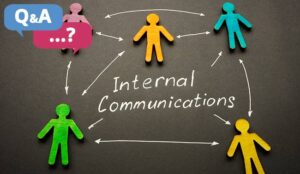Internal communication in contact centres can be awful, or it can be great, but how can contact centre leaders ensure effective and impactful communication?
With the continuation of remote and hybrid working, it is now more important than ever that contact centre leaders develop their internal communication strategies.
That’s why Daniel asked our LinkedIn Community of industry professionals:
“Does anyone have any tips or tricks on how best to create an effective and impactful internal communications strategy for contact centres? I’m also interested in how this can be made ‘remote friendly’. Any thoughts are greatly appreciated!”
Here’s what they said…
Nominate Communication Champions
We have Communications Champions within all teams who meet regularly and go back to their respective teams with any updates.
We also bring our customer care advisors into all projects relating to our team, as they are essentially the experts.
Thanks to Ross
Involve Agents
My main tip would be to involve your agents. It’s important they support in driving the ideas and strategy – especially as they are the main stakeholders of the comms!
Start with getting a passionate working group together, mind map and brainstorm – including reviewing surveys with feedback on comms, then devise your strategy around that!
Thanks to Emma
Help Virtual Comms Stick by Following a Familiar Routine
Here are a couple of tips for virtual contact centres:
- Create a familiar routine: People like to know when and where they can gather virtually. This could be a Google Hangout where people work alongside each other or a ‘fika’ – a Swedish tradition of coming together for a coffee and cake.
- Space carved out for watercooler moments: Very important virtually! Our team is currently coming together on a channel for the World Cup, despite being in 4 time zones! Virtually you have to provide more stimulus as there’s fewer organic opportunities.
- Ability to harvest knowledge: If you have an agent knowledge base, join it up with the chat channels or the online community – basically anywhere agents ask questions and gets answers. If agents have to ask questions in a separate place to searching for knowledge, it’s unproductive and annoying. Also, there are rich insights from gathering unstructured data ideas.
- Led by management: Whatever you do, make sure the management is the facilitator for its evolution rather than the instructor. Get it evolving from the ground if you can.
Thanks to Maria
You Need a Variety of Media
Effective communication is not a one-size-fits-all deal. Comms need to occur through a variety of media on a consistent basis.
For call centre employees who are super-busy, it’s important to communicate a message several times and in several ways.
Some suggestions include:
- Use your knowledge management system to house and organize comms.
- Send out a monthly newsletter. It’s good to get department leads involved to help keep them engaged. You can use this to highlight wins and challenges. You can also tie this to departmental goals. Just remember to make this user friendly, easy to read, and fun!
- Leverage Microsoft Teams (if you have it) to share weekly updates via a centralized Teams room.
- Arrange quarterly townhalls led by senior leaders for high level updates.
- Have monthly team meetings – led by line managers. (It’s good to get staff involved in leading various parts to build engagement too.)
- Leverage corporate comms for any changes and/or updates.
- Send a morning update email – with important daily reminders.
The key is honesty, timeliness, consistency, and relevancy in all. Also, always seek consistent feedback to gauge what works, then change what doesn’t.
Thanks to Nawaaz
Focus on Leadership AND Performance Messages
As an organization, I think it’s key to deliver two different types of communications:
- Leadership – This can be done in team meetings or via any channel that you are using to keep everyone aware of the company’s goal and vision.
- Performance communication – It’s very important especially in the contact centre that everyone is aware of their daily target, productivity, schedule adherence and other KPIs that you track.
Thanks to Santosh
Keep Your Comms Strategy Simple, Short and Punchy
I always fall back on using the four steps to success:
- Keep your comms strategy as simple, short and punchy as possible. This is the sort of comms strategy you want the whole contact centre to get on board with, so remember that agents and managers are busy. The last thing we should expect them to do is read, absorb, and then practise complex communications principles.
- Make a video to summarize the key points of the comms strategy you want them to remember. Recipients will be more likely to engage with your comms strategy if it’s visual and not just ‘another’ bit of literature they are expected to read.
- Both of the above points should tick the box of being ‘remote friendly’.
- Ask for agent feedback on the comms strategy. Do not expect a comms strategy written by a non-contact centre specialist to hit the spot. Involve the contact centre to make it relevant.
Thanks to Suzy
For more great advice on developing your internal communications, read these articles next:
- 7 Clever Ways to Improve Internal Communication Between Departments
- How to Improve Internal Communication in the Contact Centre
- 6 Ways to Share Information in the Call Centre
- A Simple Way to Improve Communication in the Contact Centre
Author: Robyn Coppell
Published On: 7th Apr 2023 - Last modified: 11th Feb 2025
Read more about - Call Centre Questions, Communication



































